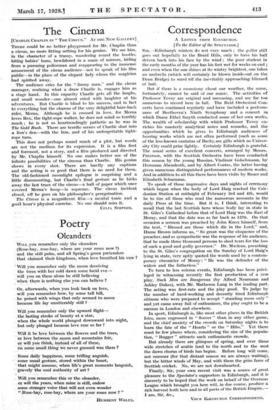Correspondence
A LETTER FROM EDINBURGH.
[To the Editor of the SPECTATOR.]
Sta,---Edinburgh winters do not vary much ; the golfer still goes out hopefully to the Braid Hills, only to have his ball driven back into his face by the wind ; the poor student in the early months of the year has his feet wet for weeks on end ; and even when the sun shines at its wintry brightest, one takes an umbrella (which will certainly. be blown inside-out on the Dean Bridge) to ward Off the inevitably- approaching blizzard of hail.
But if there is a monotony about our weather, the same, fortunately, cannot be said of our music. The activities of Professor Tovey are original and unceasing, and are far too numerous to record here in full. The Reid Orchestral Con- certs have continued regularly and have included a perform- ance of Beethoven's Ninth Symphony and a concert in which Dame Ethel Smyth conducted some of her own works. The wealth of scholarship with which Professor Tovey en- riches his masterly analytical notes and remarks, and the opportunities which he gives to Edinburgh audiences of hearing works which are not often performed (such as some of the less-known cantatas of Bach), are gifts which no Univer- sity City could prize lightly. Certainly Edinburgh is grateful. The usual series of excellent concerts, arranged by Messrs. Paterson, with the Scottish Orchestra have been conducted this season by the young Russian, Vladimir Golsclunatm, by Hermann Abendroth, and by Albert Coates, the latter having given numerous distinguished performances of modern works. And in addition to all this there have been visits by Bauer and Elizabeth Schumann.
To speak of those impressive days and nights of ceremony which began when the body of Lord Haig reached the Cale- donian Station at midnight of February 3rd and 4th, would be to tire all those who read the numerous accounts in the daily Press at the time. But it is, I think, interesting to recall that the last Scottish hero whose body lay in state in St. Giles's Cathedral before that of Lord Haig was the Earl of Moray, and that the date was as far back as 1570. On that occasion a sermon was preached by John Knox himself, from the text, "Blessed are those which die in the Lord," and, Hume Brown informs us, "So great was the eloquence of the preacher, and so sympathetic was the response of his audience, that he made three thousand persons to shed tears for the loss of such a good and godly governor." Dr. Maclean, preaching to the St. Giles's congregation on the Sunday of Lord Haig's lying in state, very aptly quoted the words used by a contem- porary chronicler of Moray: "He was the defender of the widow and the fatherless."
To turn to less solemn events, Edinburgh has been privi- leged in witnessing recently the first production of a new play, Such Men are Dangerous (by Alfred Neumann and Ashley Dukes), with Mr. Matheson Lang in the leading part. The acting was first-rate and the play good. To judge by the number of hard-working and decently tired Edinburgh citizens who were prepared to accept "standing room only" and yet came away full of enthusiasm, the play ought to be a success in London and elsewhere.
In sport, Edinburgh is, like most other places in the British Isles, more engrossed in " Soccer " than in any other game, and the chief anxiety of the crowds on Saturday nights is to learn the fate of the " Hearts " or the " Hibs." Yet there must be few places where, considering the size of the popula- tion, " Rugger " attracts such enthusiastic crowds.
But already there are glimpses of spring, and over those wide stretches of arable land to the north and to the west the dawn chorus of birds has begun. Before long will come, not summer (for that distant season we are always waiting), but the bitter winds of May, and with them the grim farce of Scottish cricket. No, we are not downhearted.
Finally, Sir, your own recent visit was a source of great pleasure to the Spectator's supporters in Edinburgh, and it is sincerely to be hoped that the work on behalf of the Overseas League which brought you. here will, in due course, produce a rich harvest both here and in all parts of the British Empire.—
I am, Sir, &c., .
YOUR ELKNBURGH CORRESPONDENT.










































 Previous page
Previous page